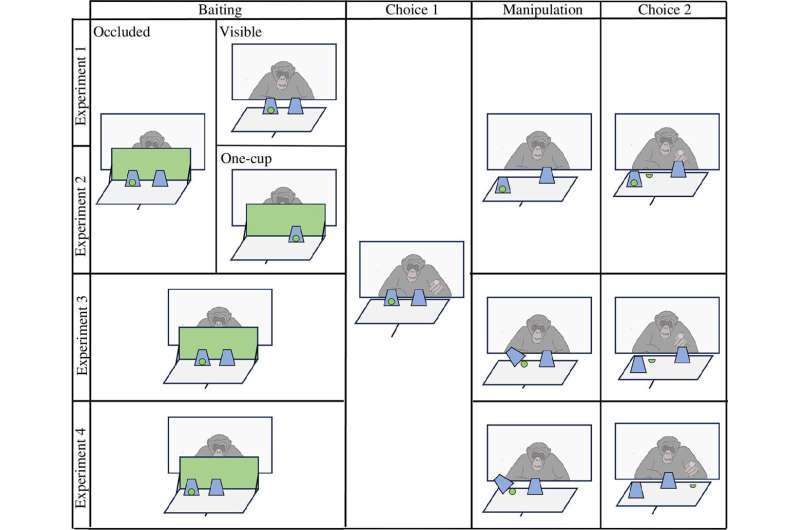June 14, 2024 report
This article has been reviewed according to Science X's editorial process and policies. Editors have highlighted the following attributes while ensuring the content's credibility:
fact-checked
peer-reviewed publication
trusted source
proofread
Chimpanzees understand that they are sometimes relying on luck when making guesses, research suggests

Psychologists Benjamin Jones and Josep Call at the University of St Andrews, in the U.K., have found via behavioral experiments that chimpanzees know that they rely on luck when making guesses about certain things. Their paper is published in the journal Biology Letters.
Prior research has shown that most people rely on luck when making guesses about things they are not certain about. Until now, it has not been clear if other animals do the same. In this new effort, the researchers sought to find out by testing the closest human relative, chimpanzees, at the Edinburgh Zoo.
They designed an experiment to show whether a given chimp understood when it relied on luck to get the right answer regarding a food reward.
The experiment involved showing a test chimp two cups—one hid a delectable snack, while the other contained nothing. The subjects had to choose which one they thought contained the treat.
In some trials, the chimp was shown which cup contained the food. While in others, it was not. After making a choice, the same chimp was then offered another choice, this time between the cup that had not been chosen and a secondary, smaller dummy cup, which the chimp knew for certain contained a smaller snack.
The researchers found that most chimps were more likely to choose the smaller cup if they had not been shown which cup was hiding the food.
In the next step, the researchers changed the scenario, adding more cups, which reduced the chances of picking the right cup. As they did so, they found the chimps' choices depended on their success rate on the first run of the experiment.
If they initially chose the wrong cup, the chimp was still more likely to pick the smaller cup in the second part of the experiment. But if they chose correctly on the first go-round, they were more likely to choose the second cup over the dummy cup—a finding suggesting the chimps felt they might be on a lucky streak.
More information: Benjamin Jones et al, Chimpanzees ( Pan troglodytes ) recognize that their guesses could be wrong and can pass a two-cup disjunctive syllogism task, Biology Letters (2024). DOI: 10.1098/rsbl.2024.0051
Journal information: Biology Letters
© 2024 Science X Network





















